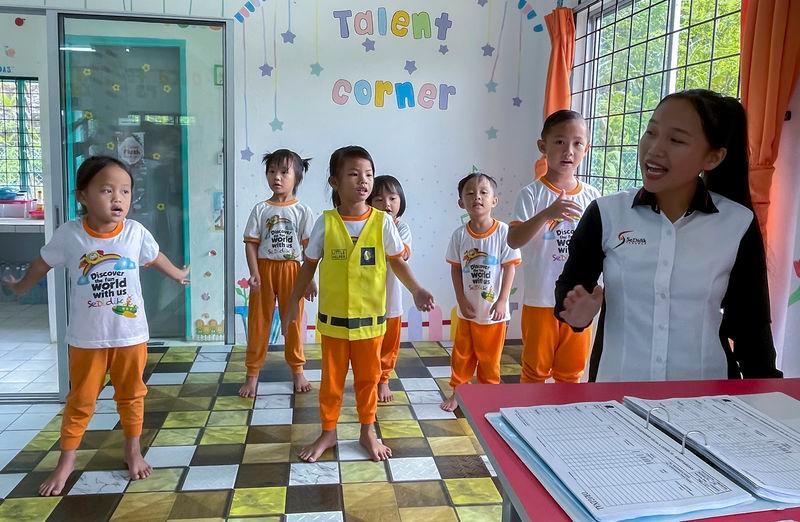WHAT does play mean to children? At pre-school and kindergarten level, it simply means the right to have fun, to interact with children of their age or of different ages, and create meaningful memories with each other. In the process they learn language, build communication skills, resilience and problem solving skills.
The concept of introducing play to pre-school and taska-based organisations has now come into the spotlight due to the recognition of its importance in the development of the brain and the concept of lifelong education.
Professor Dr Sue Jennings, founder of the British Association of Dramatherapists, is Professor of Play, a lifetime award earned from the European Federation of Dramatherapists and recognised internationally for her work in what is termed neuro-dramatic play (NDP). This term was coined during her three-year doctoral field work with the Temiars, indigenous people, many of whom still live in the Malaysian rainforest.
NDP describes the play development of all children and covers different stages of play, including the close relationship between mother and child in the early years.
“Children need to play messily before they can create form. Their play may seem chaotic but will eventually lead to order” is the mantra developed and formulated by Dr Jennings, the author of over 50 books on different aspects of dramatherapy and play therapy.
I met Dr Jennings when she conducted several workshops at a private university where I was working. Her use of puppetry, masks and messy play, as she called it, was an eye-opener for me.
The impact of play therapy
Association of Registered Childcare Providers Malaysia former president and Toy Libraries Malaysia president Wong Poai Hong believes in the power of play, having spent more than 30 years in the early childhood education sector.
“Play, whether alone or in a group setting is crucial for brain development because it gives babies and young children opportunities to experience new things, to interact with their environment and to practise existing skills which strengthen networks of brain connections.
“Play when child-directed, provides children with opportunities to make decisions – whether they want to play, what they want to do, how they will do what they choose, whether to play with others or alone.
“They also learn to navigate a complex relationship which is critical for their future socio-emotional development.
The new circuits the brain builds from play help create social agility.
Social skills are one of the greatest predators of academic success and future job stability, “ Wong said.
Purpose-built unstructured playground
Founder of Whyte House, Jery Yeoh, a graduate in sociology and anthropology from Universiti Sains Malaysia, first started his play therapy centre in 2009 with three children, which today has grown to four branches. Out of these four, one is the first kindergarten in a science centre in Malaysia, and 2 unstructured playgrounds.
‘Weplay’, according to Yeoh is the first of its kind purpose-built unstructured playground, with what he terms as “risky and loose play”, in Malaysia, and is currently located in Penang.
Jery feels the whole basis of developing a solid foundation in the early years of a child’s life has become too result-orientated.
“We have introduced young children to all kinds of programmes from a young age, they attend robotics, STEM, tuition etc etc but zero to six years is more about the process of development instead of immediate results. The child will progress naturally to robotics and STEM in primary school.
The size of the unstructured playground in Penang is around 10,000 square feet and houses hundreds of pieces of wood in different shapes and sizes, and with household items. The young children spend their time building make-believe houses, kitchens, tables, little ladders, where they climb up and down,” said Jery who is constantly amazed at their imagination.
Parenting app for local use
One addition to local initiatives to provide a conducive environment for children below the age of five to grow and achieve their best potential is the ‘Thrive by Five – My Anak’ (Tb5) parenting app developed by the Malaysian Association of Professional Early Childhood Educators in collaboration with the Minderoo Foundation in Australia in 2023.
Developed to boost a child’s brain potential by the age of five, it has over 100 parenting tips such through games, songs and dances from the various cultures of Malaysia, in four languages.
It was developed by best practices backed by the Brain and Mind Centre of the University of Sydney.
Malaysian Association of Kindergartens president Eveleen Khoo said the app has proven to have been widely used, especially in Sabah and Sarawak. The games, activities have been accessed by kindergartens there and also by parents as they are not exposed to the many activities that the app provides.
“Many are located in remote areas and the Tb5 app has brought a wide variety of activities to their doorstep,” said Khoo.
Play is now accepted as the new way forward for parents, caregivers and early childhood educators to build and grow young children into independent thinking, resilient individuals with high curiosity to develop their own abilities.
Children should not be moulded but rather be allowed to create their own individual personalities.









